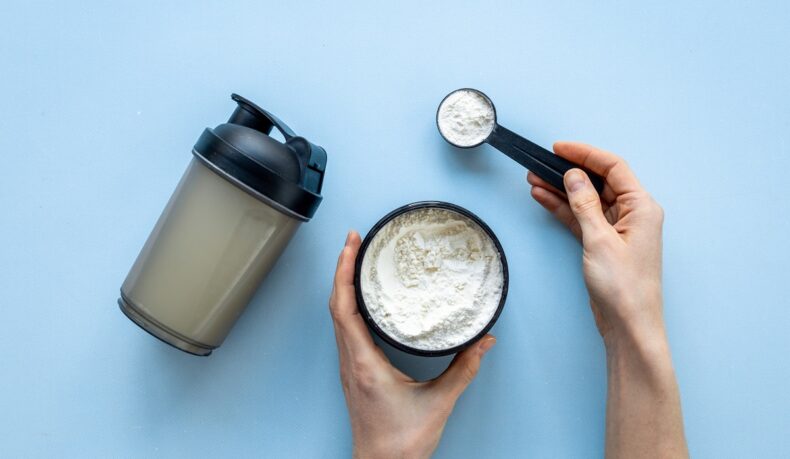Whether you’re a gym enthusiast, a busy professional, or someone just trying to meet your nutrition goals, chances are you’ve heard about protein powder. It’s one of the most popular supplements on the market—but also one of the most misunderstood. Should you take it? How much is too much? And what’s the best kind for your needs?
In this post, we’ll break down everything you need to know about protein powder—including its benefits, types, when to take it, and any potential side effects.
🧬 What Is Protein Powder?
Protein powder is a concentrated source of protein derived from animal or plant-based foods. It’s typically used to help build muscle, support recovery, or supplement diets that are low in protein.
It comes in many forms, including:
- Powders to mix with liquids
- Ready-to-drink shakes
- Bars or protein-enhanced foods
💪 Benefits of Protein Powder
1. Supports Muscle Growth and Repair
Protein is essential for muscle tissue repair. Supplementing with protein powder—especially post-workout—can support faster recovery and muscle building.
2. Helps Meet Daily Protein Goals
Ideal for people who:
- Don’t get enough protein from food
- Have higher needs (athletes, elderly, pregnant women)
- Follow plant-based or vegetarian diets
3. Weight Management
High-protein diets can help you feel full for longer, reduce snacking, and support lean muscle maintenance during weight loss.
4. Convenient Nutrition on the Go
If you’re busy or don’t have time to cook, a shake can be a quick, nutritious meal or snack.
🥤 Types of Protein Powder
🐄 Animal-Based Proteins
- Whey Protein (Concentrate, Isolate, Hydrolysate)
- Fast-digesting, high in BCAAs
- Great for muscle recovery
- Best for: Post-workout, muscle building
- Casein Protein
- Slow-digesting
- Keeps you full longer
- Best for: Bedtime shake or between meals
- Egg White Protein
- Dairy-free, complete protein
- Best for: People avoiding dairy but want high bioavailability
🌱 Plant-Based Proteins
- Pea Protein
- Good amino acid profile, easily digested
- Best for: Dairy-free or vegan diets
- Soy Protein
- Complete protein, often used in sports nutrition
- Caution: May not be ideal for people with hormone-sensitive conditions
- Brown Rice, Hemp, and Pumpkin Protein
- Often mixed with others to create a complete amino acid profile
- Best for: Vegans or those with allergies
💡 Pro Tip: Look for “complete” proteins that include all 9 essential amino acids—especially if you’re plant-based.
⏰ When Should You Take Protein Powder?
It depends on your goal:
- Post-workout (within 30–60 minutes): For muscle recovery
- Morning or between meals: To reduce hunger and stabilize energy
- Before bed (casein): To support overnight recovery
- Meal replacement (with other nutrients): When you’re short on time
🧮 How Much Protein Do You Need?
General guideline:
- Sedentary adults: ~0.8g per kg of body weight
- Active individuals: 1.2–2.0g per kg of body weight
- Athletes or muscle-building goals: 1.6–2.2g per kg
⚠️ Too much protein—especially from supplements—can strain the kidneys over time in susceptible individuals, so balance is key.
⚠️ Potential Side Effects & Contraindications
While protein powder is generally safe, consider the following:
- Digestive issues: Some people experience bloating or gas, especially with whey or casein
- Allergies: Watch for dairy, soy, or gluten-based proteins if you have sensitivities
- Kidney conditions: High protein intake should be monitored in people with pre-existing kidney issues
- Additives & sweeteners: Choose powders with minimal ingredients and avoid those with artificial colors, flavors, or high added sugar
✅ How to Choose a Good Protein Powder
- Check the ingredients list: Look for simple, clean formulations
- Look at the protein per serving: Aim for 15–25g per serving
- Avoid unnecessary fillers: Steer clear of too much sugar, maltodextrin, or synthetic additives
- Match it to your goals: Fast-digesting for post-workout, slow-release for satiety
🥗 Can You Get Enough Protein Without Powder?
Absolutely! Whole foods like chicken, tofu, lentils, quinoa, eggs, yogurt, and nuts are excellent sources. But protein powder can be a helpful supplement, not a replacement, when:
- You’re busy
- You have increased needs
- You’re recovering from illness
- You’re on a calorie-controlled diet

Protein powder isn’t just for bodybuilders—it’s a versatile tool that can support general health, recovery, and performance. The key is to choose the right type, use it appropriately, and combine it with a balanced diet rich in whole foods.
Have a favorite protein shake recipe or question about choosing the right powder for your needs?
Drop it in the comments below!

